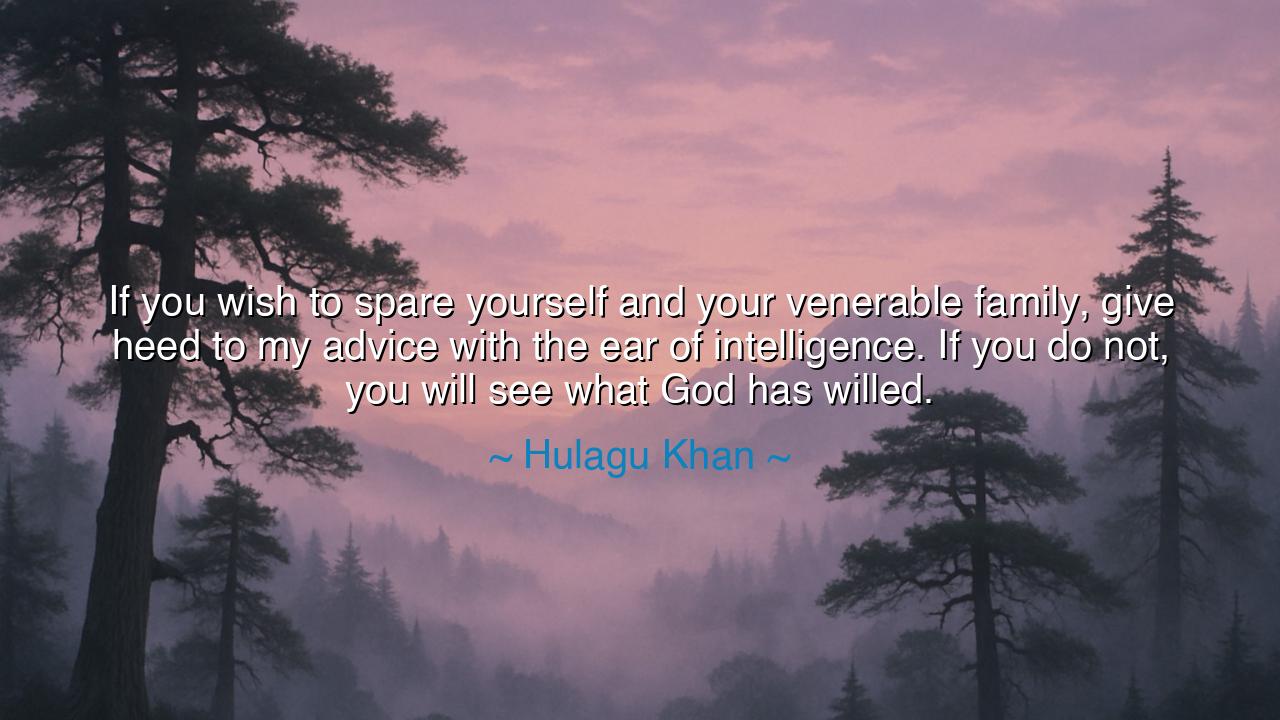
If you wish to spare yourself and your venerable family, give
If you wish to spare yourself and your venerable family, give heed to my advice with the ear of intelligence. If you do not, you will see what God has willed.






In these thunderous words, Hulagu Khan, grandson of Genghis Khan and conqueror of empires, speaks with the iron certainty of a ruler forged by destiny: “If you wish to spare yourself and your venerable family, give heed to my advice with the ear of intelligence. If you do not, you will see what God has willed.” It is a command veiled in wisdom — a warning both political and spiritual. Beneath its severity lies an eternal truth: that to listen with intelligence is to live, and to ignore wisdom is to invite ruin. Hulagu, who moved across the world like a storm, understood that power is not born only from the sword, but from understanding — from heeding the signs of fate before they become flames of destruction.
The quote’s origin lies in the age of Mongol conquest, when Hulagu Khan led his armies across Persia, Mesopotamia, and into the heart of the Islamic world. His message, often sent to kings and caliphs before battle, was both a warning and a test. He would offer mercy in exchange for wisdom — surrender, compliance, or alliance in exchange for survival. To those who “listened with the ear of intelligence,” peace was still possible. But to those blinded by pride, the fate that followed was inevitable. In 1258, the Abbasid Caliph of Baghdad refused Hulagu’s counsel. He trusted walls and words more than wisdom. And when the Mongols came, the ancient city — the jewel of civilization — was reduced to ash and silence. Thus, the Khan’s warning proved true: those who reject the wisdom of reality soon meet the judgment of destiny.
This statement, though born in conquest, transcends war. For Hulagu’s words speak to the heart of all human folly — the arrogance that deafens us to truth. To “give heed with the ear of intelligence” means to listen not with emotion, not with fear, but with discernment — to see what lies beyond the pride of the moment. History is filled with those who failed this test. Kings who ignored their advisors. Generals who dismissed omens. Nations who mistook strength for invincibility. The fall of empires, the ruin of families, the collapse of dreams — all often begin not with the swing of a sword, but with the refusal to listen.
Yet, in another light, Hulagu’s declaration reveals a strange reverence for divine will. “You will see what God has willed,” he says — as if to remind the listener that fate does not pity the stubborn. In the ancient world, the Mongols believed that Heaven favored those who understood its signs — that victory belonged not merely to the strong, but to those aligned with the eternal order. Hulagu’s words therefore carry a sacred warning: resist not the truth when it reveals itself to you, for in doing so, you resist the current of destiny itself. What follows then is not punishment from man, but consequence from the heavens.
Consider, for a moment, the fall of Troy. When Cassandra, blessed with prophecy, warned her people of ruin within the wooden horse, none “gave heed with the ear of intelligence.” Pride and disbelief clouded their judgment. They mocked her voice — and so they opened their gates to destruction. In that moment, the tragedy of Troy became the fulfillment of divine will. Hulagu’s message would have fit there as well: if wisdom is ignored, what follows is not misfortune, but inevitability.
From this ancient lesson emerges a truth for every age: intelligence is not only knowledge — it is humility before truth. The wise man listens even to those he fears. The fool listens only to himself. Hulagu’s brutal clarity cuts through the centuries to remind us that life often whispers its warnings before it shouts its judgments. Whether in the decisions of nations or the choices of a single soul, the principle remains: to hear wisely is to live wisely. To ignore wisdom is to invite the storm.
So, my child, learn to listen with the ear of intelligence. Do not let arrogance drown out counsel, nor passion blind you to reason. When truth speaks — whether through friend, enemy, or circumstance — pause and hear it. For fate is merciful to the attentive, and merciless to the proud. In every age, God’s will is revealed not in thunder, but in whispers to those who listen. Hear them, and you will walk in peace. Ignore them, and you will see what the heavens have decreed.






AAdministratorAdministrator
Welcome, honored guests. Please leave a comment, we will respond soon